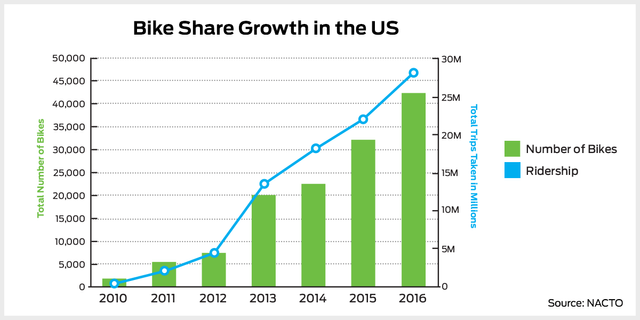The rise of innovative bike sharing startups: Business model & features to launch such a startup

The increasing demand for commuting has set the scene for modern-day taxi businesses. Enterprises like Uber, Lyft etc have managed to achieve a massive success in this domain through constant innovation and sheer expertise. As time passes by, they have expanded the business both geographically and in terms of services. From taxi booking to bike sharing services, commuting enterprises have begun exploring all the possibilities of future transportation. Today, many metropolitan cities have begun acquiescing the idea of two-wheeler commuting. In this document, we share ideas, suggest practices to help you kickstart your own bike ride-sharing business.
Rising Bike Sharing Market: An Analysis
Unlike the taxi services, two-wheeler commuting is more convenient, especially in cities. In fact, it is much affordable and is the best way to counter the hectic traffic of cities. However, a month before Uber took over a bike-sharing startup JUMP, which in fact will add benefits to Uber’s vision to become an urban mobility platform. Not only that, this decision of Uber reflects their grasp on the rising growth of bike-sharing services as well.

When it comes to figures, recent studies have revealed a drastic increase in ride-sharing services. Back in 2013, there were only about 700,000 public use bikes. But in a period of 5 years, the number has risen dramatically and now there are over 2.3 million public-use bikes in the world. However, these figures are predicted to increase further as more businesses began investing in it.
Platform-based Business Models for Digitized Commuting Business
Since the new-age commuting businesses solely rely on digital platforms now, the best is to go with a platform-based business model. Industry favorites like Uber, Lyft etc follow the same idea of the platform-based model. Moreover, the research from Forrester reveals, the digital businesses, the platform-based businesses have collectively generated a revenue of $100 billion.
Above all, the platform-based businesses are the most efficient ones, their rate of productivity is higher when comparing to traditional businesses. Besides, most of the businesses that follow this business model don’t own assets which are core to their trade. Airbnb and Uber are the best examples for this. Moreover, they can expand their business to other relevant sectors since the upfront capital cost is low. For instance, Apple has recently decided to evolve their music store into a streaming service, whereas Uber has already stepped into food delivery with their new extension UberEats.
Read the complete article here.
Congratulations @emilylynch! You have completed some achievement on Steemit and have been rewarded with new badge(s) :
Click on the badge to view your Board of Honor.
If you no longer want to receive notifications, reply to this comment with the word
STOPDo not miss the last post from @steemitboard!
Participate in the SteemitBoard World Cup Contest!
Collect World Cup badges and win free SBD
Support the Gold Sponsors of the contest: @good-karma and @lukestokes